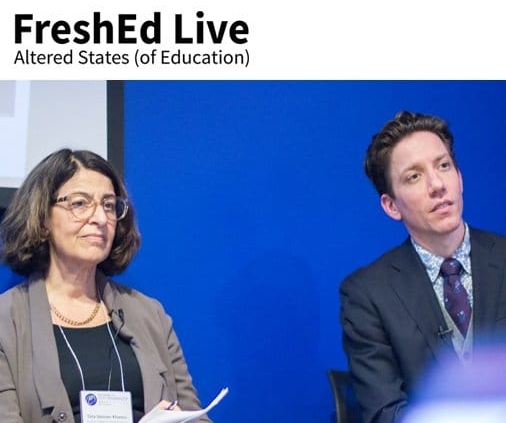Today we air the first ever FreshEd Live event, which was recorded last night in San Francisco. Gita Steiner-Khamsi joined me to discuss the ways in which the global education industry has altered the State and notions of free public education.
We touched on a range of topics, from Bridge International to theInternational Baccalaureate and from network governance to system theory. Gita theorized why the State has taken on the logic of business and how a quantum leap in privatization has radically altered education.
Gita Steiner-Khamsi is permanent faculty at Teachers College, Columbia University. In addition, she has been seconded by the Graduate Institute of International and Development Studies in Geneva as a faculty member and by NORRAG as the director.
This FreshEd Live event was sponsored by NORRAG.
Citation: Steiner-Khamsi, Gita, interview with Will Brehm, FreshEd, 150, podcast audio, April 15, 2019. https://www.freshedpodcast.com/gitalive/
Transcript, Translation, Photos, Resources:
Will Brehm 1:08
So, Gita Steiner-Khamsi, welcome back to FreshEd. I interviewed Gita for the first time about two and a half years ago. And thank you so much for joining us tonight at the first ever FreshEd live event.
Gita Steiner-Khamsi 1:20
Thank you so much, Will. It’s a big honor to be here. Will is high-tech for me. I remember when we had the Charleston CIES conference and also the regional CIES, he said, we should use Twitter and he explained how Twitter works with hundred 50.
Will Brehm 1:40
140 — tweet — or characters.
Gita Steiner-Khamsi 1:43
– And I said, this will never take off and now it’s the main communication tool of the US president, so you really proved me wrong that technology really is taking off. So, it’s a pleasure to be here. I’m humbled because it’s almost easier to have a podcast with Will without an audience because now I see all these accomplished colleagues and I feel they should be speaking also. So, I’m glad that we’re having a discussion.
Will Brehm 2:10
Maybe in the future, we can ask many other people here to join FreshEd, either in person or over Skype. So, Gita, in our previous conversation back in 2016, you called yourself, “a second-generation researcher of educational privatization”. What did you mean by that?
Gita Steiner-Khamsi 2:29
It was a statement, first on the timing that I entered the topic, but also on the debates that were going on. Actually, Toni Verger lured me into that topic. In 2014-15, we were looking for a topic for the World Yearbook of Education and we always look for hot topics that are coming up at the moment. And I was a series editor -still am now together with Toni and Terri Seddon and Julie Allan and I suggested the global education industry and of course, Toni Verger came to mind. And then Chris Lubienski, who did at that time, mostly research in the US, but now is global also. I learned a lot from working with them. At that time, the whole discussion started to move. The first generation for me are the ones that really were amazed about the explosive growth of privatization, and then public-private partnership (PPP) as a follow up. And as part of the first generation looked at why? What accounts for this growth? What changed in the environment that made the private sector move in so fast? There is this book, that is a classic, “Tinkering towards Utopia”, by Cuban and Tyack, which basically says it comes in cycles. It’s not a new phenomenon, private sector involvement. And in fact, there was big one in the 80s, but a lot of scandals evolved around the machines and the question became, why did it come back? And what is different in this second wave of privatization in education. And a lot of scholars did work on vouchers and choice and that first group, I would say -Toni Verger, Susan Robertson, colleagues that are sitting in this room, Stephen Ball- from different angles, looked either at how it changed the governance of education, but also the enabling factors such as the whole markets -what they call the market model in education or a neoliberal model in education- was the enabling environment. And I think to this day, I haven’t come across any better figure than the one that Susan Robertson and Toni Verger published in 2012 in that book, “Public-Private partnership”, the one that is edited with Francine Menashy and Karen Mundy, I think that’s the best way of explaining it. It’s its own logic. And it became a global education policy and that’s how I came in, because I’m interested in global education policies and policy borrowing. The explosive growth of choice of per capita financing, of testing, of liberalization, of who is providing education. For me, these were all global education policies and it all made sense to me why this type of global education policy is disseminating over the world. So, this is the temporal dimension, I’m not done yet.
Will Brehm 5:51
Okay, keep going. We can always edit it. [Laughter from audience]
Gita Steiner-Khamsi 5:54
I think the second wave -so the first group of scholars really talked about the enabling environment and then within them, of course, they keep writing important work. It then broke down into -for instance Toni Verger together with Fontdevila and Zancajo , I don’t know how to pronounce his last name, somehow probably,Adrián- talked about different reasons why governments buy into privatization. So, these pathways of privatization became an important contribution to theory. And it is part of historical institutionalism to look at why at one particular moment, governments or policy actors buy into global education policy. In policy borrowing research that’s an important question. Toni did that from a historical institutionalist perspective, or sometimes, he calls it also political economy, but I think it’s more historical institutionalism. And then others came up with new methods to look at it because once you see that the government ceased to be the sole provider and regulator of education, you get into network governance, and that was Stephen Ball’s contribution, also using social network analysis, trying to look at the blurred boundaries between the public and private sector. So, the first generation also created new theories and new methods. Now, the second generation. The second generation, I think, a group of us we are doing more and more trying to understand how it has 10 years after or 20 years after some countries, how has it transformed our understanding of education? How has it transformed the role of the state, but also how has it transformed the private sector? And this structural coupling, we would say, between the private and public sector is what we are talking about these days. So, for instance, and many of us have written about that. The raise of standards, the raise of testing, the raise of results-based management, results-based finance, the raise of actually transnationalism -and maybe that’s the only positive part that I would like to highlight, actually. Because the private sector is in the comfortable position to be able to work locally and globally, whereas the public sector and public schools have, by default, to work nationally. So, the private sector gets into a space that the public sector cannot offer. And I’m thinking of IB schools, International Baccalaureate schools, which have the huge raise and parents wanting English as a language of instruction. And they don’t want national history, they don’t want national geography. I mean, this is a really interesting new space that is opening up between this hybrid forms. And this is the second generation that looks at the transformative role of public-private partnership for education, and for the state, but also for education itself.
Will Brehm 9:18
So, was there a particular moment for you, as an individual, as a scholar, where you started saying, I have to get into that space of education privatization?
Gita Steiner-Khamsi 9:30
I think it’s maybe the first time I was really shocked about the private sector involvement is when I heard from Natasha Ridge, who works in the UAE, she had this quote, which is in the chapter that also was part of the 2016 volume, the global education industry. She had this quote from GEMS Foundation, by Varkey, he meant it positively, that he says, “We sell first-class, business and economy class education, like an airplane. We use the airplane model of education, because we want parents to pay for what they can afford”. So, if they can only afford little, they pay less tuition. So, they have English as a language of instruction, but it’s taught by Pakistanis and Indians. If it is a first-class education, then they have to pay more, then their children have access to gym, to after school program, and to American and British teachers. So that was the first time I was really “shell shocked” when I heard about this as a model, like the business model of education. And the whole purpose of public schooling is all about social cohesion. It is about the social mobility, it’s about redistribution and equity. So, this is when I was shocked. And the other thing when I was shocked -at Teachers College, we had this discussion on Pearson, when I realized that Pearson gets rid of publishing and newspapers because education is so much more lucrative. That’s when I realized that there’s really something going on that we need to understand better what’s going on.
Will Brehm 11:39
So, you bring in this systems-level approach theory to the study of educational privatization. What is a systems level approach -quickly? And then what is it actually tell us about educational privatization that hasn’t been looked at before?
Gita Steiner-Khamsi 11:57
Why quickly? So just to say a few words, I mean, people use systems theory – I know Steve Klees uses it negatively, so it has a net negative connotation – But it’s not what Steven Klees means. It is really a very specific theory by Niklas Luhmann. Systems theory in comparative education also Schriewer and Florian Waldo and Barbara Schulz, we are a whole group doing systems theory. The idea of systems theory is that systems are closed entities -operatively closed- and every now and then they open up and are open for change. We have that in policy studies with theories that believe in “punctuated equilibrium” – Sabatier, Kingdon. These are the theories that also believe that not much is happening until something comes and there is a moment of openness, and then change happens. So, in moments where they just operate in a closed way, we have our own language in education, we have our own beliefs, our own values, own actors, which is completely different -or supposed to be completely different- than the economy, the political system, the science system. So, the question in systems theory is what happens when the systems approach each other. And we have that with science and politics in evidence-based policy planning. These are two systems that are structurally coupled, in evidence-based policy planning, as a result of which politics becomes more and more scientized or pseudo-scientized in the form of what some scholars call, “mode II knowledge”, policy relevant knowledge, which has nothing to do with foundational research but it’s “mode II” kind of knowledge, policy relevant knowledge. So, politicians themselves, they really take on the scientific argument. And scholars become, as a result of evidence-based policy planning, more and more politicized, and agenda-driven also. So, this is the structural coupling between science and politics. And what we have since the 1990s, in many countries, is the structural coupling between education and the economy. And which means that education takes on economistic thinking such as demand-supply, this was never ever a criteria or a language that we used in education, but it has become the new normal. And in aid and in development, the idea that you have conditional aid at the programmatic level -we always had in aid and development, we always had structural adjustment and poverty alleviation and then good governance, we always had macroeconomic conditions- but now the macroeconomic conditions are now at the program level with you know, results-based aid based on what is being accomplished or not. So, this is very much an economistic way of thinking that you pay for a product. And you weigh what the product is, and the quality of the product. And this is a totally new thinking. And I’m of the opinion that there is no way back.
Will Brehm 15:46
So, we’re stuck?
Gita Steiner-Khamsi 15:50
We are stuck. We have to live with the private sector, but we have to study it and understand it better.
Will Brehm 15:58
So, what are the things about the private sector and its involvement in the coupling as a system to the public sector? What is it that we should be looking at? Or what is it that you’re looking at?
Gita Steiner-Khamsi 16:09
The thing that I really find important to understand is how not just -the neoliberal is like a label. The market-model in education enabled non-state actors to come in, but not now only as a provider, and that’s Chris Lubienski’s big thing: As a policy entrepreneur, they became policy advisors. Gates Foundation, and they’re very open about it, that they don’t want just to give money, they want to disrupt. And actually, Laura Pappano’s work on the Silicon Valley is all about ed technology that wants to disrupt, that wants to innovate. And this model of innovation that the private sector says it can do better than the public sector is important to study. What do they exactly mean with innovation? And with disruption of public education? And what does it lead to? Is it different kinds of education? And is it different than what we know in aid? I’ve been a big critic, and actually Iveta and I, the book that we did on the Soros Foundation, we noticed that Soros Foundation, but many other foundations and aid in general, there’s this assumption that you fund a pilot project -and the word “pilot project” is another word for innovation. Nowadays, we would say innovation- you fund innovation. And then later on, when it’s successful, the government or somebody, another donor will scale it up. It never happens! It never, never happens. And a lot of aid is just really expensive pilot projects that are not scalable, and that actually are disruptive in a really bad way. Because you use all government resources, you bring corruption into a country, you bring big salaries, big money, but it’s not sustainable. So, the question is, how does the private sector work differently? And I must say, it’s not just negative. Like in India, especially when there is local philanthropy involved and local providers like Corporate Social Responsibility (CSR) money, they tend to have cheaper pilot projects or cheaper innovation, and they are more worried about sustainable change. So, I find that’s important to study: the way of interventions, how interventions are done. But the whole other thing that I mentioned earlier, but maybe we talk about it later, what worries me is this increase of testing of standardization, of orientation towards results. And I think this has to do with the government opening up as a provider and changing its mode of regulation from what Stephen Ball would call from government to governance. So, from rules and regulation to outcomes orientation and monitoring of outcomes and results.
Will Brehm 19:24
So, is that a result of the private involvement in the state? Like is this because of standardization and testing, this reduces cost overall? I mean, it just becomes much cheaper to do a standard test for not only one whole country, but something that could conceivably be put through all different countries.
Gita Steiner-Khamsi 19:43
So, it is. Again, this is like a systems way of looking at things- Sociological systems theory- it was an enabling environment for businesses to come in because when I worked in the Ministry of Education, and I worked almost 10 years in Switzerland, there were two ways of regulating: one was to ensure that everyone follows the rules and regulation that we passed. And the second one, believe it or not, were surprise visits to schools. That’s the way how regulation used to work. And this is like completely different than now with establishing standards, having schools make students take tests, look at the test-based accountability. Toni calls it test-based accountability, and then do self-evaluation after self-evaluation, annual report after annual report, this is the current way of evaluation. So, once you have standards, because you have a outcomes evaluation, it becomes lucrative and interesting for business because you can sell the same product, not just to one school, you can sell it to whole district, to 10 districts, to 10 countries, to the whole world. And this is how Pearson and Cambridge and all these brand names work. So, standardization, on one hand, was a condition for businesses even being interested in education, to make it lucrative for them. But once they enter the scene, they further standardize it. They further -and that’s a way to reduce costs by selling the same item to more people.
Will Brehm 21:41
So how did they get legitimated then? I mean, is it the state has to say like, we trust these standards, and they can go all across every district?
Gita Steiner-Khamsi 21:51
I think the whole accreditation policy -higher education had that much earlier than the school. Higher education is used to privatization and many countries actually had it at school level. In India, they have for many years, different what they call, “boards/exit exams” and examinations that are taken, and they are side by side. And there is very often the risk that there is a Cambridge board certification, there’s an IB board, there is the Pearson schools. And then the risk is that the public sector become the rest category. And that’s where I think the Abidjan Principles became important to look at the state’s role for public education. If you have no regulation at all, and no concern for equity, you might very well end up having diversity at parallel education systems run the private sector. And parents can choose, and they can choose a first-class model or economy model. And then what the real risk is that the middle class exits the public education system, that’s my biggest worry. That’s my biggest worry that once the middle school exits the public education system -and this happened in many developing countries, and this is happening in the US- then you don’t have spokespeople at the political elite for public education. You don’t have spokespeople for equity for social mobility and what have you. So, it is important to -there is no way not to work with the private sector but it’s really important to examine all the negative but also positive aspects actually, when it comes to transnationalism I think.
Will Brehm 23:54
So, do you think that these sort of movements: the Abidjan Principles, the strikes happening around the US, do you think this is really going to make a change to the relationship between the public and the private sectors of education? Or do you think the private sector is just going to continue to usurp more and more power?
Gita Steiner-Khamsi 24:18
No -you know, there are some, but the governments have to come on board and the multinationals have to come on board. For me, for instance, Global Partnership for Education (GPE) is a good multinational, they have good values. They also are in results-based aid, but to a much lesser extent than others. They have a fixed part and they have a variable part and part of the variable part, they have good principles. They have equity, efficiency and learning outcomes, I can subscribe to every one of them. And they withhold, they withhold 30% of the grants, they give until those conditions are met. But can they uphold their principles, especially if they collaborate in an environment where they collaborate more and more with other founders? So, this is one of the questions. But also, the national -some national governments- when we had the Abidjan Principles, this guidelines for states regulation towards public education -I think that’s how it’s called right? Is it? How is it that. The states obligation for-
Audience Member 25:33
– to provide to regulate private involvement.
Gita Steiner-Khamsi 25:34
Yes. Yes. NORRAG helped organize the meeting in Geneva and you had government officials from Finland, from Portugal, and France, they really believe in a strong public education system. So, there are governments that believe in strong public education and they believe in allowing the private sector to provide education, but they regulate it. And that’s a different approach than having for-profit education come in and take over.
Will Brehm 26:18
Finally, how does the human rights perspective -which we hear a lot about at a conference like this- fit into this conversation of a systems level analysis of public and private education?
Gita Steiner-Khamsi 26:30
This is a very interesting and complicated discussion and I see Robyn is here and Prachi, they worked a lot on low-fee private schools. And it’s an interesting marriage, actually. Because in India, and South Africa, and Brazil, where they have CSR, and at the same time, a Right to Education movement, that helped boost the private sector, actually. That helped the private sector to come in. Also, in Pakistan, where they pass the rule wherever in a radius, I forgot, 15 kilometers, there is no public school around, then anyone who presents themselves as able to open up a school, they get vouchers. So that’s a form of privatization, vouchers is a form of privatization. That was a way to fill the need and fill the gap of public schooling. And, again, that also became attractive for the private sector to move in. That was Pearson -with the PAL, the Pearson Affordable Learning fund- they support low-fee private schools, especially also in countries where they have a lack of public schools. So, it is at the one hand, the right to free public education. But at the other hand, you also have the need to have more schools. And at this first stage, it’s free. But you never know what happens at the next stage. And I think that’s the one thing that is not studied enough. That very often the private sector comes in, and they pilot something, they bring innovation, for free through some foundation. And then later on when it’s scaled up, they asked for fee. And even the mother of all NGOs, BRAC who we all love they moved from being a free system to a low-fee, private school system. So, if BRAC did that, just imagine which other NGOs will move into this direction in the future.
Will Brehm 28:58
Well, Gita Steiner-Khamsi, thank you so much for joining Fresh Ed.
Have any useful resources related to this show? Please send them to info@freshedpodcast.com
Altered States of Education









































